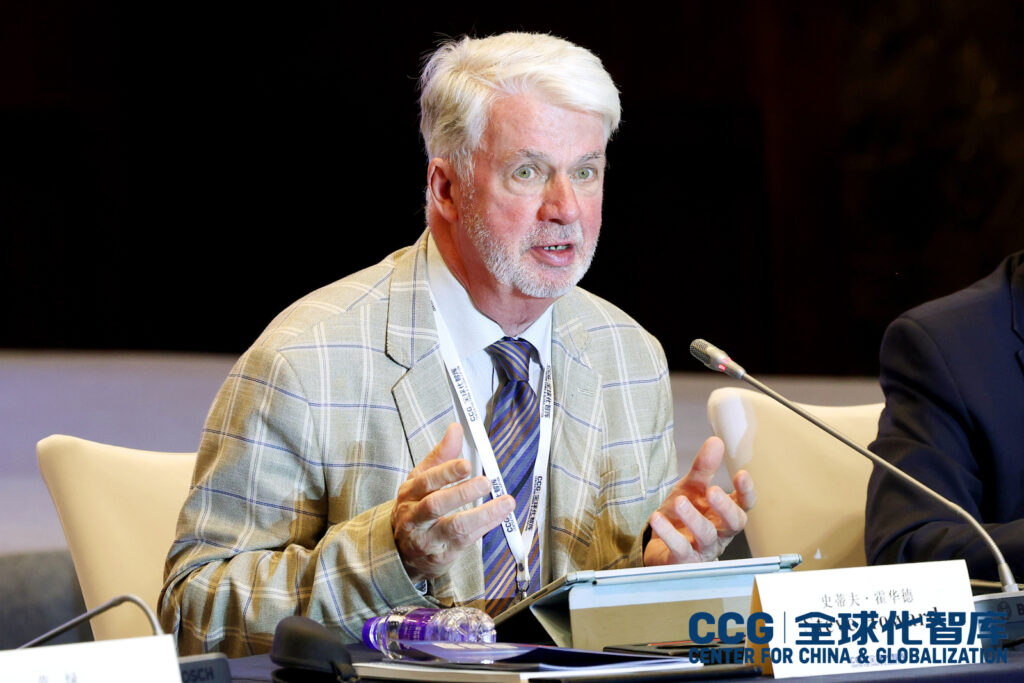Speech by Steve Howard at the Beijing Mission 2024

“Thank you, Henry, and thank you to you and Mabel for the outstanding job in organising CCG and bringing together such an impressive forum. I’m honoured to be here and to have heard such wisdom already, and I should do more listening, I think, as we just heard from our colleague from Egypt.
I don’t disagree that the world is potentially falling apart and that we have some choices to make. Think of what we do in our organisation. I live in Australia, but we work in the world, so I’m stateless. It really is an expression of being post nation state in many ways, which many of you are. And we really are a platform rather than an organisation or an institution to bring together others who are much more powerful than we are so that they can affect change.
Our model, which has been supported by many world leaders, is of cooperative globalisation. Pope Francis is one of those world leaders who’s embraced that work. I’ll come back to that. Others are Christine Lagarde and Jin Liqun at the AIIB. It looks a bit endangered now, cooperative globalisation. So, there’s a need to remake it and remake global governance. I think all the thoughts that have come before are extremely important and powerful. My view is that the global commons will force us to act. In other words, we may not have all the choices that we think we do to not cooperate. We will have to work on what we have in common and what sets us apart. And I’m referring to matters such as climate change and nature and biodiversity, which are the present focus of our work.
Just a few weeks ago, I spoke to a security dialogue taking place here in Beijing, mainly between senior Chinese former officials and senior American officials who spoke about hard security, about issues in this corner of the Asia Pacific. I spoke about Antarctica because it’s a continent very close to Australia and to Australia’s heart. It has no governance; it has a treaty system, it’s fragile. It’s a classic case of where we need to remake global governance for the future to preserve our world. If Antarctica’s ice should melt (and heaven forbid), sea levels would rise by 60 metres. This is not a technical question, it’s a political question. It’s a question of cooperation. So, my view is we should act. We should do something. We should mobilise others who are more powerful, and our project on shaping global governance around climate and nature is growing.
We’re starting here in Beijing tomorrow with the conversation and then going on to Rome, where Henry and Mabel, others in this room and world figures will join us, and we’ll be received by Pope Francis. Yes, the Vatican. He said, not so long ago, he thinks of this not so much as the end of an era, but the end of an epoch.
So, we’re living through this transitory time. At the heart of our work is the notion of enlisting business, business with purpose, those major corporations that have the capacity to change, invest and make the difference to make our planet sustainable. And they will join us. They have the money to do these things. An example: President Lula in Brazil has a very ambitious project to help save the Amazon tropical forests by creating a sovereign investment fund that invests in global markets at large scale and some of the proceeds then go towards the local people of the Amazon to avoid them having to sell their forests for other purposes. Use the power of the markets and business for good in coalitions between all sectors of society. So, we’ll go on to Rome, we’ll go to Brazil, India, the United States, elsewhere. Our ambition is to have 10 significant global conversations, at least, over three years. The notion of therefore saying while we are not clear about the future, we’re going to aim to create it while we’re doing it and that’s what I would encourage those at this meeting to think about as we go away. Thank you.”
